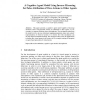Free Online Productivity Tools
i2Speak
i2Symbol
i2OCR
iTex2Img
iWeb2Print
iWeb2Shot
i2Type
iPdf2Split
iPdf2Merge
i2Bopomofo
i2Arabic
i2Style
i2Image
i2PDF
iLatex2Rtf
Sci2ools
IEAAIE
2011
Springer
2011
Springer
A Cognitive Agent Model Using Inverse Mirroring for False Attribution of Own Actions to Other Agents
This paper presents a cognitive agent model capable of showing situations where self-generated actions are attributed to other agents, as, for example, for patients suffering from schizophrenia. The mechanism underlying the model involves inverse mirroring: mapping preparation states onto sensory representations of observed actions. It is shown how this mechanism can develop based on Hebbian learning. The model provides a basis for applications to human-like virtual agents in the context of for example, training of therapists or agent-based generation of virtual stories.
Artificial Intelligence | Cognitive Agent | IEAAIE 2011 | Sensory Representations | Virtual Agents |
| Added | 29 Aug 2011 |
| Updated | 29 Aug 2011 |
| Type | Journal |
| Year | 2011 |
| Where | IEAAIE |
| Authors | Jan Treur, Muhammad Umair |
Comments (0)

